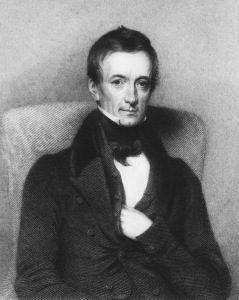Think of a famous Manchester-based scientist and your mind almost certainly conjures up
John Dalton (famous for his work on Atomic theory), Alan Turing (famous for the Engima
machine, and for being a mathematician and NOT a scientist) or Ernest Rutherford (famous for his work on radioactivity). Some of the more cerebral of you might even have thrown William Sturgeon (an English physicist, responsible for the first electromagnets) or Hans Geiger (a German physicist who helped to discover the atomic nucleus) into the mix. I would be surprised if anyone would have named Peter Mark Roget, yet we all use his research on an almost daily basis.

Roget, the son of a Swiss pastor, was born in London in 1779. He read Mathematics and Medicine at Edinburgh University, where his prestigious talent saw him graduate as a Doctor of Medicine at the ripe old age of 19. After his time in Edinburgh, he moved back south of the border and settled into a role at the Manchester Infirmary, where he was made chief surgeon in 1804, at the preposterous age of 25. His main work at the Manchester Infirmary was concerned with tuberculosis, and the potential effects of nitrous oxide (laughing gas) as an anaesthetic, publishing several papers on both topics. He also found time to form the Manchester Medical School.
In 1808 Roget moved back down to London, where he helped to establish the London Royal Society of Medicine as well as the University of London, whilst continuing to publish work on human, animal, and plant physiology and health. He also found time to serve as the secretary to the Royal Society, invent a pocket chess set and provide inspiration for the development of the Zoetrope (a cylindrical-shaped toy which displayed a set of pictures giving the illusion of movement – a precursor of modern cinema).

In 1840 Roget retired, enabling him to begin work on his greatest accomplishment – the snappily titled “Thesaurus of English Words and Phrases Classified and Arranged so as to Facilitate the Expression of Ideas and Assist in Literary Composition”, which was first published in 1852 (you can see its original format here). He first began compiling his thesaurus when secretary of the Portico Library in Manchester, which – for those of you who have yet to visit – is the perfect way to spend an afternoon over a book and a pot of tea.
Roget’s remarks in the preface to the first edition, in which he observes that, “Since my retirement from the duties of secretary to the Royal Society… I resolved to embark in an undertaking that has given me incessant occupation”, give some indication as the man’s formidable work ethic. He sadly spent most of his life battling depression (both his father and his wife died young, whilst his uncle committed suicide in front of him), and there is some thought that this gave rise to his work on the thesaurus.
A quite exceptional polymath, whose professional life and accomplishments leave a lot to be admired (not to mention envious of), I would like to extend my personal gratitude to this great man, without whom my lexicon would be as empty as a pachyderm’s trunk.
Post by: Sam Illingworth